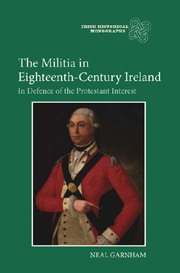Book contents
- Frontmatter
- Contents
- Preface
- Acknowledgments
- Abbreviations
- Introduction: Militia issues
- 1 To 1691: Precursors
- 2 1692–1716: Establishment
- 3 1716–59: Maintenance
- 4 1760: Action
- 5 1761–69: Reform Debated and Attempted
- 6 1769–78: Reform Achieved
- 7 1778–82: Volunteering Ascendant
- 8 1782–85: Fencible Men and the Militia Reconsidered
- 9 1785–93: Indecision and an Act
- 10 Conclusions
- Bibliography
- Index
Preface
Published online by Cambridge University Press: 05 February 2013
- Frontmatter
- Contents
- Preface
- Acknowledgments
- Abbreviations
- Introduction: Militia issues
- 1 To 1691: Precursors
- 2 1692–1716: Establishment
- 3 1716–59: Maintenance
- 4 1760: Action
- 5 1761–69: Reform Debated and Attempted
- 6 1769–78: Reform Achieved
- 7 1778–82: Volunteering Ascendant
- 8 1782–85: Fencible Men and the Militia Reconsidered
- 9 1785–93: Indecision and an Act
- 10 Conclusions
- Bibliography
- Index
Summary
This work has been completed over an extended period. My interest in the Irish militia in the eighteenth century was first sparked by research undertaken as an undergraduate in the 1990s. Further work led me to realise that the organisation, or at least mention of it, was a ubiquitous feature of the period. For the most part though, historians have been sceptical of its importance and utility. This study is, in part, an attempt to give the Irish militia in its pre-1793 form, and the ideas that surrounded it, the prominence they deserve. It highlights the social importance of the militia, especially in the years prior to the 1760s. The militia's roles in defining men's places in local hierarchies, and reinforcing both the connexions and divisions in society, are considered. It also examines the militia as an organisation through which the relationships between subjects and the state could be negotiated. Militia service drew men into alliance with the state, and demonstrated to outsiders the nature of the nation's polity. The political actions and rhetoric that surrounded the militia are also considered.
The Irish militia issue differed substantially from that which existed elsewhere in the king's dominions. English true Whigs saw a militia, an army of citizens, as a necessary counter-balance to a standing army dependent upon the monarchy for its authority, and through which royal patronage could be exercised. In Scotland a militia was desired to demonstrate Scottish independence of spirit, and to allow for the maintenance of traditional social interdependence.
- Type
- Chapter
- Information
- The Militia in Eighteenth-Century IrelandIn Defence of the Protestant Interest, pp. vii - viiiPublisher: Boydell & BrewerPrint publication year: 2012

